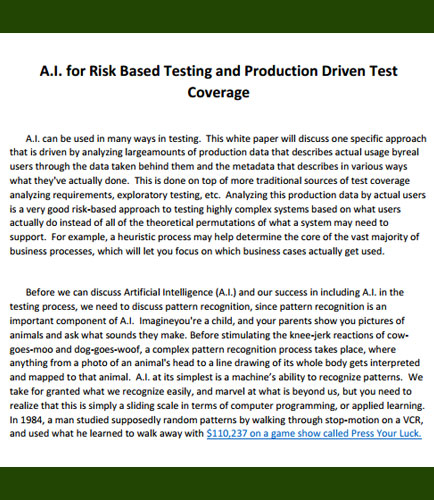
PROCESSING. PLEASE WAIT...


White Paper: QualiTest Group
Analyzing large amounts of production data by actual users is a very good risk-based approach to testing highly complex systems based on what users actually do instead of all of the theoretical permutations of what a system may need to support.
Is software testing capable of employing A.I. approaches, or will human software testers soon be bested by computers as well?
This white paper highlights one specific approach that is driven by analyzing large amounts of production data that describes actual usage by real users through the data taken behind them. It discusses:
How A.I. can help the 5 basic sources of test coverage
Different ways in which A.I. in testing can also be used
Risk-Based Testing-Which test cases are most important and most likely to encounter failure, and how do you limit the count?

By: L&T Infotech
Every organization should have well-organized and effective testing strategies in order to increase test efficiency and deliver high quality software. Test data is one of the most important factors in overall testing life cycle. Scenario-specific, realistic, right-sized, masked test data created in test environments ensures the following: - Scenario-specific test data availability before test execution increases test efficiency/quality and reduces overall testing cycle time. - Realistic test data in lower test regions reduces production defect leakages. - Right-sized test data in test environments reduces space utilization and increases the response time. - Masked test data ensures security compliance
By: Software AG
Digital business transformation is based on an IT architecture transformation with a roadmap for digital capability implementation. Based on the software platforms, digital companies create enhanced or totally new business models which offer completely new digital customer experiences. Established companies are building up software know-how and are acquiring software companies to accelerate their digital transformation by injecting software innovation capabilities into their core business areas. This whitepaper helps to understand what makes today’s digital challengers attractive to customers and consumers, as it highlights their core competencies and differentiators based on their digital software-based technology. Key takeaways from this whitepaper: Digital challengers separate companies from their customers Implementing digital capabilities for digital use cases Digital companies have a micro services-oriented, scalable IT architecture


 2024 All Rights Reserved | by: www.ciowhitepapersreview.com
2024 All Rights Reserved | by: www.ciowhitepapersreview.com